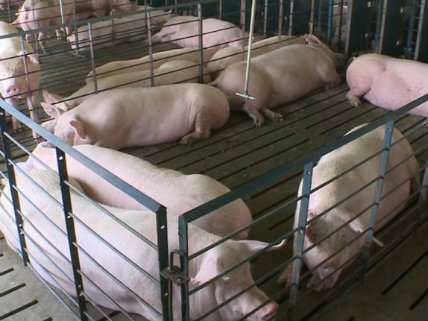Four Charged for Taking Photos of Pig Farm Under Utah's 'Ag Gag' Law

Four activists have been charged under Utah's controversial "ag gag" law, which prohibits taking photos and video, recording audio, or obtaining access "under false pretences" at places "used for the production of livestock, poultry, livestock products, or poultry products."
The activists, all part of the Bethesda, Maryland-based Farm Animal Rights Movement (FARM), pled not guilty to "agricultural operation interference" and trespass. Police say the group drove onto private property at Circle Four Farms in Milford, Utah, and took illegal photographs. FARM attorney T. Matthew Phillips, said the activists were on a public road, photographing Circle Four Farms buildings for a project documenting pigs' journey from farm to slaughterhouse.
This is only the second time an ag gag law has been enforced in the United States.
Seven states—including Iowa, Kansas, Montana, North Dakota, and Utah—have passed so-called ag gag laws, which make it a crime to record farm animals or workers without a farm owner's permission. Only Utah has attempted to enforce the law previously, in 2013, after Amy Meyer recorded a video of a sick cow being pushed by a bulldozer. The charge was dropped because Meyer had been filming from a public street; she's now part of a federal lawsuit challenging Utah's law.
Reason columnist Baylen Linnekin, director of the Keep Food Legal Foundation and a professor at George Mason University Law School, has been vocal about his opposition to these laws, which he sees as "wrongheaded", overbroad, and unconstitutional. "If an individual or group is trespassing on or otherwise sabotaging a farm operation, then that individual or group can and should face civil suit and/or criminal charges," he writes on the Keep Food Legal website. "Photography, though, is a separate issue. One need not support the means or goals of animal rights groups to recognize that members of these groups should enjoy the same First Amendment freedoms as everyone else."


Show Comments (46)